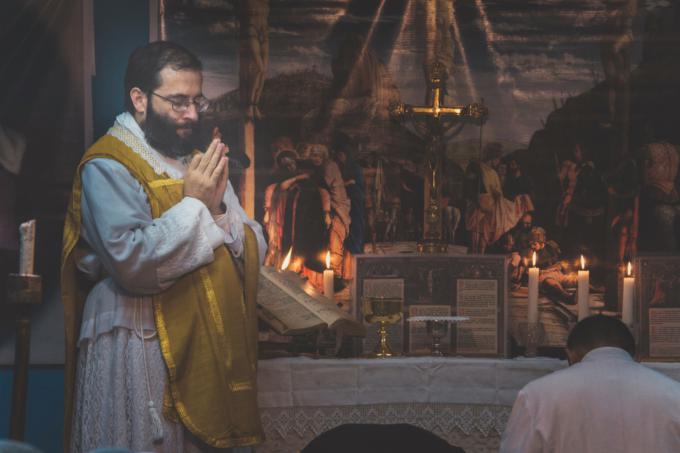
Culture
The Church's long-standing discipline of celibacy, it is useful to remember, is the priestly commitment not to marry, following the practice of Jesus and mandated for at least a thousand years in the Western Church.

Erlandson
In one of those embarrassing public dust-ups that occasionally afflict our Church, a soon-to-be published book on priestly celibacy was publicized as being co-authored by retired Pope Benedict XVI until he let it be known that he was not the co-author and wanted his name removed as such.
Coverage of the controversy provided enormous publicity for the book, which is entering a crowded field. Several have recently been published defending the traditional practice of celibacy in Latin-rite Catholicism.
The Church's long-standing discipline of celibacy, it is useful to remember, is the priestly commitment not to marry, following the practice of Jesus and mandated for at least a thousand years in the Western Church.
In recent years, it has been an oft-debated topic for a couple of reasons. The first is the growing shortage of priests in some countries and the assertion that the commitment of celibacy deters some from joining the priesthood.
The second is the sexual abuse scandal, with the suggestion that a married priesthood would not be as likely to harbor child abusers, although statistics of sexual abuse in families would not seem to support this assertion.
While the number of priests per Catholics in countries like the United States has been going down -- now one for every 2,000 here -- in other regions of the world it is much worse. In the vast Amazonian region, the estimates range from one for every 10,000 to one for every 20,000. The reception of the sacraments is correspondingly infrequent.
Last fall the special Synod on the Amazon attempted to address this gap among other problems facing the region. The synod fathers recommended consideration of the proposal that "suitable and respected men of the community with a legitimately constituted and stable family" and who are already permanent deacons, be ordained as priests "to sustain the life of the Christian community ... in the most remote areas of the Amazon region."
The recommendation is seen by some as potentially undermining the Church's commitment to celibacy and may have at least indirectly inspired the forthcoming book to which retired Pope Benedict contributed.
Whether Pope Francis will act on this recommendation or ask for further study is still unclear, but in an interview during a papal flight January 2019, the pope made clear his belief that "celibacy is a gift to the Church" and he does not think it should be made optional. He added that "there could be some possibility" of ordaining married men in remote locations, but even that would require further study.
What sometimes is lost or misreported in the debate over celibacy is that there are already exceptions that the church in her wisdom has allowed.
Eastern-rite Catholics, for example, are in union with Rome and have had a married priesthood for centuries (although this was a point of conflict in the United States, where they were restricted for many decades.) As is true for the Eastern Orthodox and for deacons, a man must be married before he is ordained, and he cannot remarry once ordained. Bishops can never be married.
More recently, the Church has also allowed married clergy from other denominations who enter the Catholic Church to be ordained as priests. This is allowed on a case-by-case basis and must be approved by the Vatican. Last year, as the debate over the Amazon synod flared up, a married, former Pentecostal minister was approved for ordination to the priesthood for the Diocese of Steubenville, Ohio.
None of this means that the Latin Church's historic commitment to a celibate priesthood is changing. And judging from Pope Francis' words, he affirms that commitment. Quoting St. Paul VI during his interview, he said, "I would rather give my life than to change the law on celibacy."
- Greg Erlandson is director and editor-in-chief of Catholic News Service.
Recent articles in the Culture & Events section
-
Boston and the nation respond to the San Francisco Earthquake of 1906Thomas Lester
-
See you in the storyLaura Kelly Fanucci
-
'Dignitas' and the mediaRussell Shaw
-
Scripture Reflection for April 14, 2024, Third Sunday of EasterDeacon Greg Kandra
-
St. Helena's House is established in the South EndThomas Lester


















